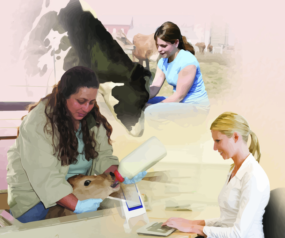Editor’s note: Ryan Dennis is the son of a dairy farmer from western New York and a literary writer. One of his first published essays originally appeared in Progressive Dairyman in 2009 – “Tempting the Language of Farming.” That essay was nominated for the Pushcart Prize, the most prestigious creative essay awarded to a U.S. essay writer.
The Dennis’ family still dairies and maintains a 100-plus-cow herd of Holsteins and Shorthorns. Dennis’ columns will appear in future editions of Progressive Dairyman.
Part of our land borders woods that surround a dirt trail that is mostly washed into a gulley through the valley. It used to be a road called The Turkey Path. My grandfather has told me over and over again about the old stagecoach that went down The Turkey Path, styled with trimmings and carrying people in elegant period dress, although it is hard to imagine it now after the locust trees and rainwater have overtaken the road.
My grandfather also tells of a time when he worked The Turkey Path Fields with horses at 10 years old. He turned too sharp at the end of a furrow and tipped the drag over. The harness broke and the draft horses sprinted into the next town. He walked the mile home, crying, the distance overwhelming to a young, upset child.
My father told me several times about a specific day that he finished disking The Beehive Field while my grandfather started planting it. My grandfather stopped the tractor, descended the steps and began to urinate next to the front tire. My father also pulled the parking brake in his tractor.
Looking to surprise him, my father picked up a small, flat stone and threw it towards my grandfather’s feet. The stone made a looping arch, curved through the air, and hit my grandfather on the back of the head. He fell to his knees. As the story goes, my grandfather recollected himself, pulled up his pants and later remarked, “I think I got some on my hands.”
The L-Shaped Field. The Corral Piece. The Lime Pile Field. The land we work comes with a past that predates me and sometimes my father. I have known the names since I was a child, because that is how we talk about the fields.
The co-op used to store a large mound of lime at the end of one of the plots on the hill, and although the pile has been gone since the ’60s, that is how it has been acknowledged since.
I am not sure how much past I have added to our farm, or what stories I will have that I am a part of to tell those who follow after me. There are times I remember getting the haybine or plow stuck in wet spots that I was told to avoid, or when I pulled the pin on a silage wagon and it nearly rolled down a bank and into the road.
But these aren’t stories. They are things that are no different than what happens in any field.
There’s the legend of the Hairy Women of Klipnocky that live in the woods around our fields. They come out at night to play tricks on the locals. Still, those are the tales of others. I have never seen one myself.
I grew up milking our cows; it has informed my personality and thought process, and although I leave the valley for months or years at a time, I have always found myself back home. I know I have more to contribute because I don’t yet have the stories that describe my place on the farm.
One day my father reflected on the history of our farm: how his grandfather started it on the hill without electricity – one of many farms in the valley at that time – and how my grandfather built it up so it could remain profitable. Much of it was sold when my grandfather retired.
Since then, it has been my father’s legacy to hold on to what is left – for which he has gone through extraordinary measures. After nearly dying, he had to fight lawyers, banks and other institutions while learning to walk again.
It is an account of determination and fortitude that needs to be told and will exist among future generations. It is up to me to understand what has happened the best I can, so when it is up to me to explain it to others, I can do it with the earnestness and sincerity it deserves.
There is the temptation to stop my father or grandfather when they begin a story that I already know. Sometimes I jump to the end and recite the conclusion early, but then feel guilty about it, as if I had taken something from them.
I do not yet know if my legacy will be like my father’s – to hold onto a family farm when it is difficult to do so, or if I will be tested as severely. What is certain is that my grandfather is aging, and there may come a time when his memory will fail.
My father, too, will someday pass away, taking his recollections with him. When that happens, it will matter less that I’ve never seen the lime pile, as long as I will be the next one to tell its story. PD

-
Ryan Dennis
- Columnist
- Email Ryan Dennis






